English Words in Action, Group T
(a variety of English words which have developed through history and are currently used in our modern age)
Simply click on this banner (or the following link) and you will be on your way to stimulate your brain for greater word comprehension with quizzes based on some of the words in this unit.
The smell of the meat cooking on the stove for the family's dinner tantalised their cat, but it wasn't permitted to eat any of it because there was canned food that was intended for it.
2. Etymology: from Greek, Tantalos, "the Bearer" or "the Sufferer," + -ize, "to form verbs."
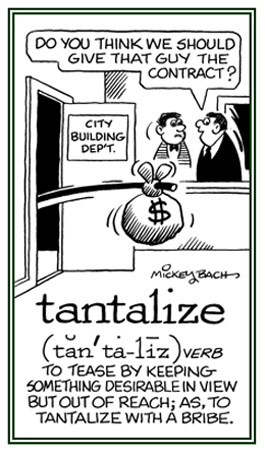
Go to this Word A Day Revisited Index
so you can see more of Mickey Bach's cartoons.
2. An angry outburst by a child or by anyone who is behaving like a child: Whenever Nolan doesn't get his way at work, he goes into tantrums.
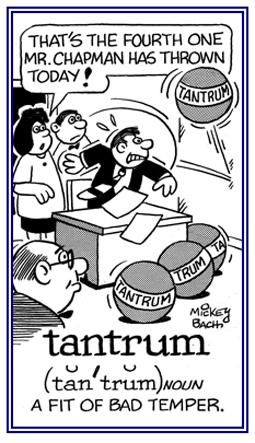
Go to this Word A Day Revisited Index
so you can see more of Mickey Bach's cartoons.
This unusual affliction of tarantism was associated with melancholy, stupor, madness, and an uncontrollable desire to dance that was violent and energetic and it often continued for three or four days and such dancing was considered the only cure for the tarantula venom.
2. Etymology: tarantism (also called tarantismo or tarantolismo) comes from the town of Taranto, Italy."Tarantula is the name for any of various large, hairy, ground-dwelling, predaceous (hunter and killer) spiders.
Tarantulas are large black wolf spiders of southern Europe whose bites were formerly believed to cause tarantism or what appeared to be an uncontrollable desire to dance.
The historical background of tarantula spiders
In about 708 B.C., a group of Greeks from Sparta moved across the Adriatic Sea and established a colony on a favorable spot on a seacoast in southern Italy called Tarentum.
The current city, now called Taranto, is a naval base in Italy; however, the region around ancient Tarentum had a species of fearsome-looking, hairy spiders that were capable of inflicting painful, if not dangerous, bites.
Based on the name of the place where this spider was discovered, it was called a tarantula and so, during the MiddleAges, when a strange disease broke out in various parts of Europe which caused twitching or jerking of the limbs of the people that were afflicted and was accompanied by an almost uncontrollable impulse to dance, it was blamed on the bites of the tarantulas.
Based on the false belief that tarantula bites caused the disease, the so called dance was called tarantism and now it is called chorea (Greek, choreia, "dance"), disorders of the nervous system shown by involuntary, jerky movements; especially, of the arms, legs, face, and by ceaseless rapid complex body movements that look well coordinated and purposeful but are, in fact, involuntary and uncontrollable.
2. To make less valuable; to disgrace; to degrade; to dishonor: The scandal in the news certainly tarnished Mr. Smith's reputation as a good mayor of his city.
3. Etymology: from French ternir, "to make dull"; from terne, "lusterless".
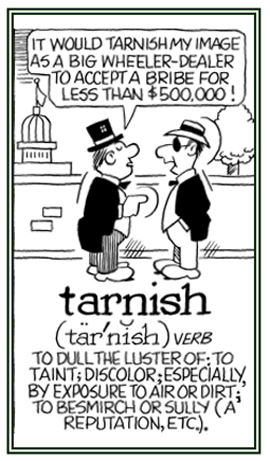
Go to this Word A Day Revisited Index
so you can see more of Mickey Bach's cartoons.
The removal of a tattoo is usually difficult and it is not always satisfactory; because, a big scar almost always results.
Sometimes doctors treat small tattoos by completely removing the colored area of the skin and stitching the wound together at the edges.
2. A fast rhythmic beat: The rain could be heard hitting a tattoo on the roof of the back porch.A continuous rhythmical beating tattoo was being made on a drum by the musicians.
3. An outdoor performance in the evening with music and marching by members of a military group: The local army unit was entertaining the local citizens in the evening at the summer fest with special tattoos.4. Etymology: from Dutch taptoe, "to shut the tap (of a beer barrel)"; a signal at closing time in the taverns. Originally, "a signal for military people, or soldiers, to return to their quarters".
When the skins of people are tattooed, even by professionals, it is potentially dangerous; especially, if the person who tattoos does not follow strict sterile procedures because hepatitis and AIDS can be transmitted through the needles that introduce the dyes.
Large tattooed areas on the skin are sometimes removed by dermabrasion (high-speed sanding to reduce the pitted scars) or laser (concentrated beam of light radiation) treatments in order to decrease the size of the scars.
2. Inexpensive and of bad quality; gaudy and cheap: Some people think that the talented violinist dresses in a tawdry style (old blue jeans, hair in a pony tail, etc.) which are in bad taste for the concerts he gives.

Go to this Word A Day Revisited Index
so you can see more of Mickey Bach's cartoons.
2. Concerning that which is crowded or bustling: The teeming multitudes of journalists were hustling and elbowing around for the best spot outside the city hall in order to get the best photos and interviews.
3. Etymology: from the Old English teman, "to give birth to" from "being fertile, pregnant, or producing babies."

Go to this Word A Day Revisited Index
so you can see more of Mickey Bach's cartoons.
2. Etymology: from Latin tenebrosus, "dark"; from tenebrae, "darkness, shadows."
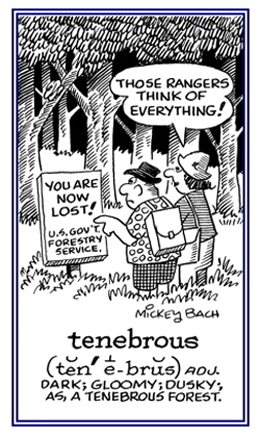
Go to this Word A Day Revisited Index
so you can see more of Mickey Bach's cartoons.
The valley is covered with a tenuous mist.
Tenuous also describes something that is used in a more figurative sense meaning of slight importance; weak; flimsy; vague; unsubstantial; such as, presenting a tenuous argument, story, or claim.
2. Etymology: from Latin tenuis, "thin, drawn out, meager, slender"+ -ous an element that makes adjectives from nouns, meaning "having, full of, inclined to."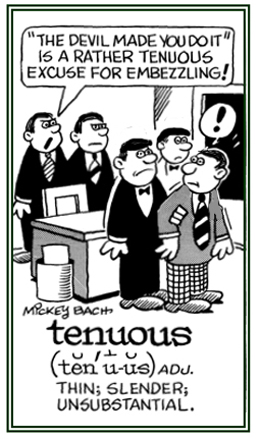
Go to this Word A Day Revisited Index
so you can see more of Mickey Bach's cartoons.
Links to all of the groups of English words in action, Groups A to Z.
You may see the bibliographic list of sources of information for these words in action.


